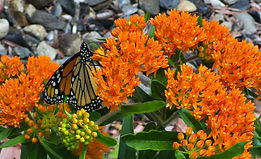Five hundred yard field trip
Observable ecology lessons for home and school



What is the five hundred yard field trip?
The Five hundred Yard Field Trip is a series of curriculum units for teachers, parents, youth leaders. The goal of the Five Hundred Yard Field trip is to help students create a habitat using native plants and learn about the ecosystem created. Lessons are free to download on this site. Plants are easily purchased from MA native plant nurseries. See the "Get Plants" tab for the native plant nursery in your area. No bus fee or permission slips necessary, plant, watch and learn!
Curriculum Units

The Pussytoes Project: Grades K-2
Pussytoes are a wonderful, low growing plant which sends up its distinctive "pussytoe" white flower in May. These plants are one of the host plants of the American Lady butterfly, the life cycle of which can be observed on the plant. Pussytoes bloom in late May, a perfect time to take students out and observe science close-up.

Mini Meadow: Grades 3-5
In this unit, students will plant a more varied group of plants: flowers and native grasses that support a variety of caterpillars and other pollinators. All the plants selected for this unit are drought-proof and non aggressive. Students will learn about the relationship between these plants and the insects that rely on them.

The Structure of Plants and Insects
(Now available)
In this unit, students will the structures of plants that govern both reproduction and survival. Students will also be introduced to insects that have corresponding structures that tie them to these plants. This unit is designed to satisfy many of the life science standards for MA, VT, NH and NY for grade 7
FREE PLANTS FOR TEACHERS

Spring 2026 will be our last
distribution of plants. Plants can be picked up from the nurseries under the "Get Plants" tab. Submit form on the "curriculum" tab
We can only give plants to schools or other educational spaces in Massachusetts. We are priortizing educators willing to help us publicize the project through their the school's media and press releases to local print or television media as well.